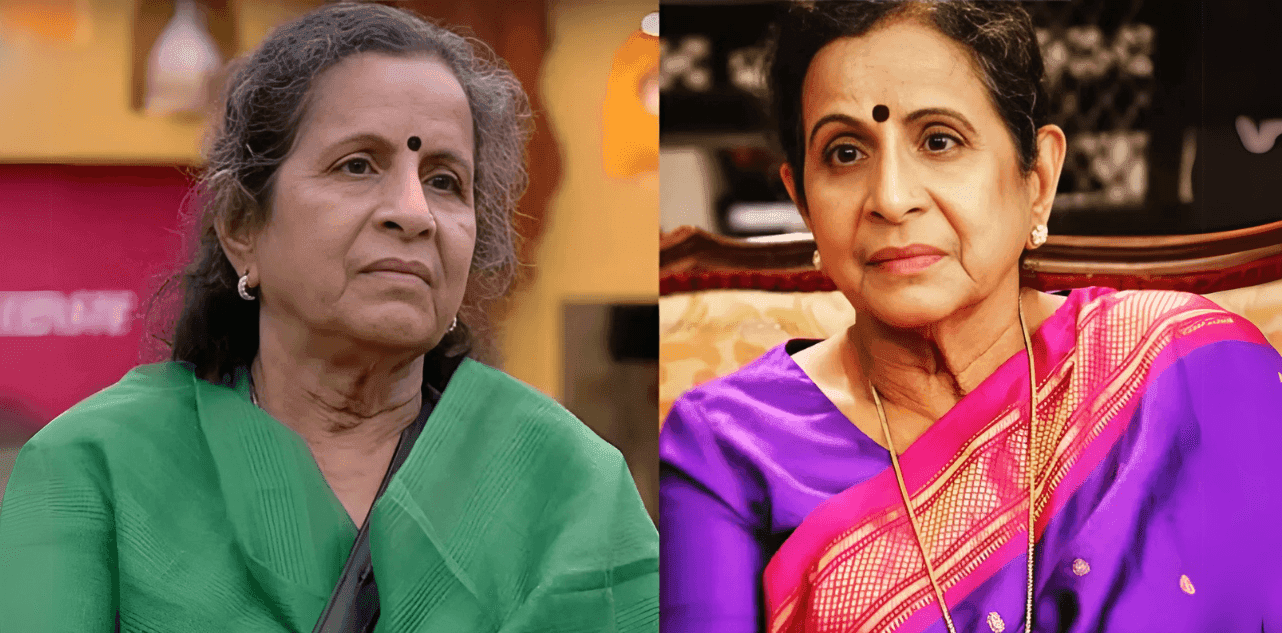Monday 16 February 2026
"Toh Main Bhi Gussa Wali Thi": Usha Nadkarni Spills the Beans on How Her Family Embarrassed Her for Singing at Lata Mangeshkar's Ganapati Function
Share

Usha Nadkarni recalls how she was attacked physically and mentally bullied as a child for singing on stage during a cultural festival, providing a tear-jerking glimpse of her childhood hardships
But behind strong on-screen presence and strong characters is a secret existence of early rebellion, inner strife, and strength gained through struggle. In a recent guest stint on Bharti Singh and Haarsh Limbachiyaa's podcast show, veteran actress Neeraj Grover shared a stunningly intimate childhood story that will better illustrate her emotional and cultural struggles way before she was even a household name.
Recalling one of her earliest experiences, Usha Nadkarni recalled when the tide had been in her favor — when as a kid she had been quarreling with the conservative mindset of her orthodox family, just because she would adore dancing. A kid, Usha had gone to Ganapati functions at Lata Mangeshkar's house, then a fairly well-known singer. It was supposed to be a festive occasion, replete with music, religiosity, and cultural pomp.
But as soon as her relatives got wind of it, he’ll let loose. "Papa dhundke maar ke ghar laate the," she remembered, her voice faraway and nostalgic. Her father was quick and ruthless — he went out searching for her, brought her back, and brought her home.". What started out to be a celebratory banquet of her own artistic inspiration turned into a humiliation and punishment process.
Her mother's had been mental. Usha explained the way her mother, disapproving of her participation in the show, had behaved in a ghastly manner. "Mummy ne mere kapde sab bahar fek diye the," she explained. In a single gesture, her mother had left all of Usha's clothing outside the door — a symbolical rejection, a wordless but powerful penalty intended to humiliate her into submission.
It's a moving photograph — a young woman, having danced in front of the masses, comes home standing physically but rejected emotionally by the very same masses she had loved. It evokes dismal images of the price most women paid for pursuing their aspirations in a world where social norms were hard and unforgiving.
In her voice strung with pride, she declared, "Toh main bhi gussa wala thi." They are not acrid words of an angry young woman outraged but the lightning moment of rebellion which ultimately proved to be her anchor as an actor. It was that refusal to let go that allowed her to hold on to her passion for acting and dancing even when society and the family were trying to close it down. Her words are a testament to every artist who has had to fight through family and society in order to stay true to art. It is a statement that resistance will probably be the initial reaction to greatness, particularly where there is repression.
Usha's story is not so much about her as it is about a larger struggle that many Indian women, particularly those of the earlier generations, faced. To pursue dance or drama was immoral or rebellious, so much so for girls. Family reputation, social norms, and sex roles would pressure nascent talents cork their imagination. In order to do that, Usha's choice to continue fighting for her passion wasn't just courageous — it was revolutionary.
She has left her mark both in Marathi cinema, as also in Hindi films, and was given a devoted follower base and accolades. But her recent revelations add to her legacy another dimension — that of a woman who was not so much an actress, but who would not be deterred by the limitations placed on her when she was a little girl. Her tale is a testament to the restorative power of the arts, and to the will it takes to continue doing one's work in the face of everything — even your own house against you. It is a harsh reminder too of the psychic scars with which most artists live, and how their finest efforts all too often happen before they ever set foot on stage or in front of a camera.
Usha Nadkarni’s childhood story isn’t just a tale from the past — it’s a powerful narrative of resistance, grit, and passion. Her words continue to echo the lived experiences of countless individuals who have dared to break the mold, and in doing so, carved a path for future generations to express themselves freely.
Newsletter
Stay up to date with all the latest News that affects you in politics, finance and more.